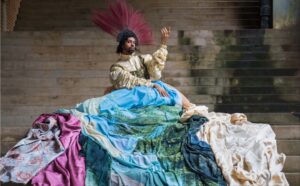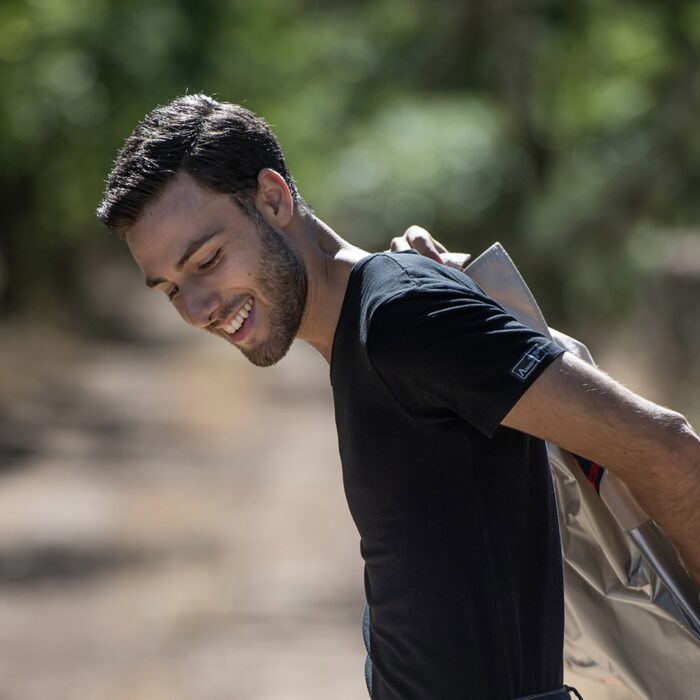
Q & A: Bruno de Sá & Ligiana Costa On Their New Show ‘The Grain of the Voice’
Brazilian Male Soprano Bruno de Sá & Dramaturgist/Scenic Director Ligiana Costa Illuminate Voice
By João Marcos Copertino(Photo: Íris Zanetti)
Bruno de Sá is a star. As the first Brazilian singer to sign a contract with a major record label, he has every reason to be the pride of a nation. However, it was not until recently that he received the proper honors in Brazil. As part of his artistic residency at São Paulo’s Teatro São Pedro, Bruno, along with his dear friend, dramaturgist and scenic director Ligiana Costa, presents a new show fully centered around one bold theme: voice.
“The Grain of the Voice” is a collage of a wide repertoire (from Baroque to Alban Berg), celebrating not only Bruno’s unique instrument, but the lyrical voice itself. Amidst their intense rehearsal schedule, Bruno and Ligiana found time to chat with OperaWire.
For those curious, the concert will be available on YouTube starting Friday, October 11.
OperaWire: Bruno and Ligiana, thanks for the interview. My first question is for Bruno. How does your voice work
Bruno de Sá: My voice works like any other human voice. The only difference is that it’s a bit more uncommon. If you think of it as a masculine voice sounding in a feminine way—a male body with a female voice—but then we would get into a discussion of gender, and that’s not the case here. I am a man with a soprano voice, period. My vocal breaks are the same as a soprano’s (both in the lower and upper registers). Comparing me to a countertenor is also problematic. A countertenor, traditionally, is a tenor or baritone who developed his “head register” or falsetto. Let’s say it’s a “manufactured voice” with all the quotation marks possible. In my case, I’m neither a tenor nor a baritone. All the lower notes I sing are the result of my work to access my own “chest register.” So, I truly sound like a soprano. If you place me next to a female soprano, you’ll notice some differences—just as you would between Anna Netrebko and Diana Damrau. Thus, it’s not a matter of gender, but of voice.
Each voice is unique—and I think this is exactly the point of “The Grain of the Voice.” To highlight this specificity, this essence of each voice: the voice that sings, moves, and expresses.
OW: That’s a very important point. You both decided to name the show “The Grain of the Voice”— a clear reference to Roland Barthes’s article in his book “Music-Image-Text.” Despite the text’s popularity, the term “grain” is somewhat exotic when applied to voice. How did that come about?
Ligiana Costa: Obviously, Barthes was on my mind. However, when I first invited Bruno to create a concert with a series of pieces, I called it “pastiche.” But “pastiche” carries an expectation of linearity, and I believe our show is more of a poetic delirium—we have much freedom, no narrative, no characters, just archetypes. After a while, we decided we needed a theme, and that theme would be the voice itself. Bruno loved it. I then began researching various philosophical reflections on voice, along with poetic quotations. We even invited my Amerindian friend, Carlos Papá, to speak in Guarani about how the voice is nourished by the forest in order to exist: the voice needs the humidity of the Atlantic Forest to resonate; in essence, our singing comes from the forest. It was during this extensive research on voice that I returned to Barthes’s essay. I particularly enjoyed the mystery he creates in trying to define what “the grain” could be, and I wanted to preserve that in the show. It’s also important to highlight how collective the research process was. Many ideas originated from me, but a great deal came through collaboration with our artistic director, Renato Bolelli Rebouças, and Sofia Boito, our dramaturgist and my general assistant.
OW: In this rich exploration of voice, it’s fascinating how idiosyncratic Bruno’s voice is. Unlike other singers who fit within a specific vocal tradition, Bruno, you come from Brazil, where there’s no established school for sopranist singing—perhaps not even anywhere in the world.
BDS: Am I an island? Laughs. I’m not trying to boast, but in this new generation of male singers who call themselves “sopranos,” I might have been one of the first. I get the impression that now it’s even becoming somewhat of a trend. But it’s possible to establish some general standards for male sopranos. Not all sopranos, for instance, can sing the Queen of the Night; roles like Susanna, Despina, Zerlina, or Donna Elvira fall into a different category. Thinking about the male soprano: How does the voice sound in the high notes? Can he control his vibrato?
It’s part of an ongoing and evolving discussion about Fach (voice classification). I still find myself explaining my vocal possibilities to casting directors—and they need to grasp what’s being done scenically: after all, it’s a male body singing a female role. This phenomenon is influenced by hormonal and genetic factors, and it’s uncommon and rare.
LC: It is partially in this aspect of the rarity of Bruno’s instrument—in its grain—that I think our show debates gender. It’s inevitable. In this show, we “take a bow,” as Madonna says, to Bruno’s voice—and to how our sensory experience revolves around it. Our entire artistic direction is addressing centuries of operatic tradition, but in a collage-like, sustainable way, stitching together these relationships between gender, voice, and repertoire.
OW: Also, this connection between Bruno and other voices seems to deconstruct the idea of him being a vocal island. Would he be more of a peninsula?
LC: Partially, yes. Whoever attends the show will also see a history of opera in São Paulo through his voice. However, the conceptualization of this concert also stems from Bruno’s isolation in the Brazilian operatic scene. Bruno, should you explain?
BDS: The show came about partly because I wasn’t being booked to perform in Brazil. I had just signed with Warner—the first Brazilian singer to do so—and had released my first CD, but Ligiana was angry that nobody was booking me. I even told my agent I wanted to return to Brazil, to sing in my homeland—I said I could perform in smaller towns, not just in the major symphony halls in São Paulo and Rio. But nothing happened; there was little interest. I even changed agents because of it. Then, Ligiana found a solution: she made me an “artistic resident” at the São Pedro Opera Theater. This show is part of that project.
LC: Exactly. At the time, I was particularly inspired by Lisenka Heijboer Castañon’s “Faust [working title]” at the Dutch National Opera. I was struck by how she could create an operatic collage that was as meaningful as a full opera, while still being deeply contemporary. I talked to Bruno about it.
BDS: Exactly, and she also encouraged me to expand the possibilities of my voice beyond the usual association with the Baroque repertoire. I don’t have to be tied to just one style or one specific role—it’s about celebrating the voice and its possibilities. Wherever there is beauty, I want to be there.
OW: On a related note, you’ve mentioned in previous interviews that you’re looking to expand your repertoire into Romantic opera. You even provocatively mentioned singing Violetta in “La Traviata!”
BDS: Exactly. I believe in the intimate relationship between opera and voice. Through voice, we narrate human emotions. In Baroque opera, the characters are often just archetypes—genderless in a way. This is also reflected in our show. As for Romantic cross-gender roles, each “Rigoletto,” each Gilda is different, and if I were invited, I would bring my own interpretation to the character.
OW: To clarify: will there ever be a “Traviata” with you starring in it?
BDS: “Traviata”? I study Violetta just for my own enjoyment. Do I have it scheduled? No. But in April, I’ll be singing Donna Elvira at the Komische Oper in Berlin, in a new production.
OW: Do you know what your gender will be in this “Don Giovanni?”
BDS: I don’t know anything yet. They briefly mentioned there might be some textual adaptations, but I can’t tell you more because I don’t know more myself.
OW: What fascinates me about you singing these major 18th and 19th century roles is the connection with opera’s large LGBTQ+ fanbase. It would be interesting to see how those same love stories work when performed by homosexual couples—especially in transgressive stories like “Traviata.”
BDS: I believe that when you stage such transgressive interpretations, there’s a rupture in traditional imagery. What is the place of gay characters on the operatic stage? Why is there such a cult following for Callas? Because many gay men see something of themselves in Callas. “She has something I wish I could be, but I can’t, because I’m a man.” When we start breaking these assumptions—with artists like me—there’s a realization of new possibilities. I still remember when I sang “The Little Mermaid.” Many gay men came up to me afterward and said I had no idea I was living a gay dream: I even had a tail!
OW: Indeed, but there’s also a cost to breaking so many barriers…
BDS: Definitely, because my existence is transgressive in the face of misogyny. When you deviate from the traditional masculine point of view, you become unacceptable to some people. That’s why there’s far more acceptance of women playing trouser roles than the reverse.
LC: It’s interesting how these reactions reveal a lack of understanding of opera’s gender-bending past, which was so common for centuries.
BDS: Ligiana, I’ve heard all sorts of comments, from critiques about the shoes I wore to my fake eyelashes and makeup. I even read an online comment once saying it was a shame that a man sounded like a woman.
LC: That’s misogyny in action!
BDS: Exactly!
LC: It’s important to note that our concert doesn’t provide a conclusive stance on gender and voice. We don’t pretend to have all the answers. We’ve thrown many ideas into the mix. In our cast, we also have a baritone singer who is a trans woman and still retains her baritone voice. She was selected for her voice, but it’s fascinating how she also embodies my vision of “the grain,” going beyond assumptions about image and voice. It’s amazing to picture the grain as something light, levitating until it blossoms into a sunflower.
OW: It’s interesting that the show opens with one of the most vocally driven melodies ever composed: Bellini’s “Casta Diva” from “Norma,” the epitome of a soaring aria.
LC: Exactly. It’s almost an aria about the art of singing. But I’m very calm. I know Bruno will nail it!
OW: Thank you very much for your time and availability!
Categories
Interviews

